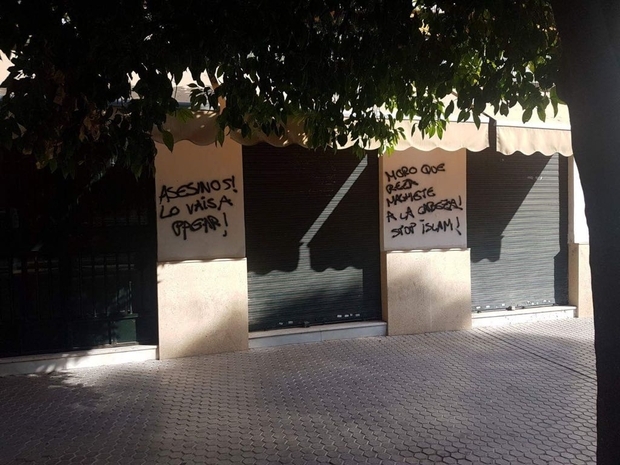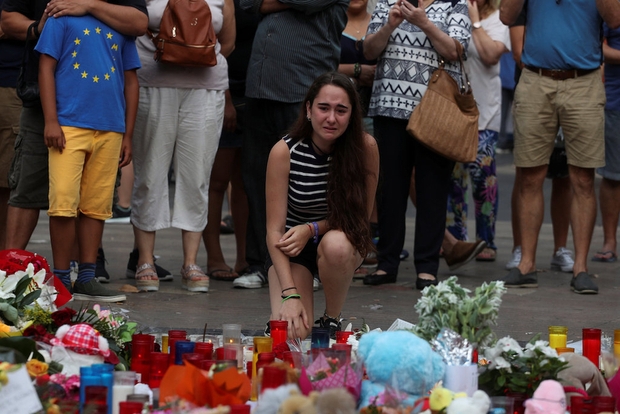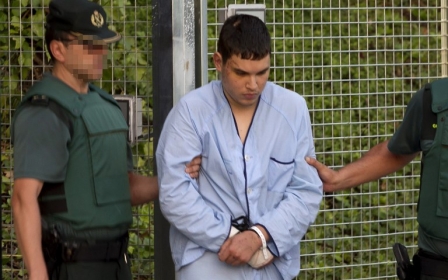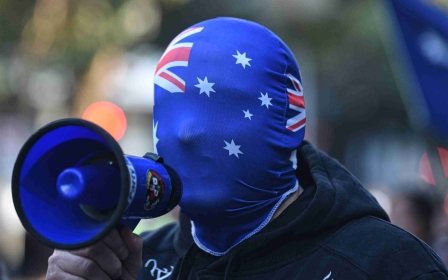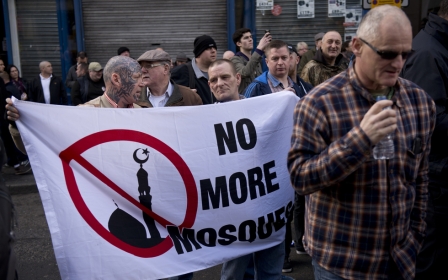After attacks, Spain’s Moroccans fear rising Islamophobia
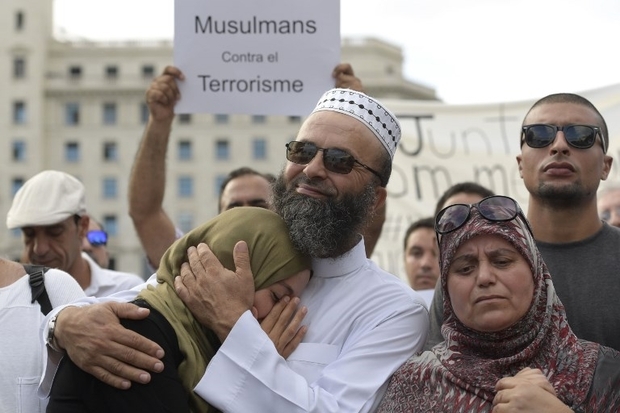
“I was in a public garden when I heard Spanish children tell Moroccan children who were also playing in the park: ‘Moroccans! Terrorists!’ It really saddened me.”
Ouafa, a mother of two, has been living in Barcelona for a few years, and like other Moroccans contacted by Middle East Eye, she is worried.
Since the attacks in Barcelona and Cambrils, which killed 15 people and injured more than 120 on 17 August, and the identification of the assailants as Moroccans and Spaniards of Moroccan origin, something has changed.
Not only are they attacking mosques, but language too has changed a lot on social media
- Ali Lmrabet, a Moroccan journalist based in Spain
Several attacks and racist aggressions against Moroccans have been documented, from the Moroccan consulate in Tarragona, about 100km south of Barcelona, being sprayed with red paint, to graffiti on mosques threatening the ‘Moors’ of reprisals.
A Moroccan teenager was assaulted in Puerto de Sagunto, near Valencia. According to his testimony, he was attacked and insulted, and told to “Get out of here, go to your country, f*** Moors...!”
“Not only are they attacking mosques, but language too has changed a lot on social media. A bunch of right-wing and even far-right journalists are serving up an incredible hatred to their many followers,” said Ali Lmrabet, a Moroccan journalist based in Spain.
“Our community is not very organised, and the Moroccan diplomatic services do not really help us, we are left to our fate,” said Fatiha Almouali, an activist for the NGO Unitad Contra el Fascismo y el Racismo (UCFR), which fights against racism and injustice in public policy, the media, and the education system.
“We must wait for the storm to calm down. The return of our children to school in September will be very difficult. We expect that veiled women will be verbally or physically assaulted, as usual. We will try to face this challenge by our own means.”
‘Our community had enough problems already’
Sohaib Hassani has lived in Barcelona for seven years. He tries to remain optimistic despite the feelings of sadness and fear that prevail in his community.
“Unemployment, discrimination in housing or employment, discrimination against veiled women: our community has had enough problems already,” Hassani told MEE, insisting however that anti-Moroccan feelings are not very widespread in Catalonia.
“We are used to racist incidents, but they are likely to increase. We hope that these acts will remain isolated, and that these difficult times will pass quickly.”
“I trust the Catalans’ intelligence. They have always treated us well; they know that the far-right and even the classical right try to pick up these attacks and exploit them,” Hassani said.
“The Catalans themselves have always had problems with the right. I’m sure they will not identify us with the culprits,” added Hassani, who is active in Barcelona’s NGO sector.
The reaction of some Spaniards in Barcelona last Friday proves him right. When around a dozen fascist activists tried to demonstrate in the centre of Barcelona, passers-by pushed them away, shouting “No to the racists”.
Translation: Moving to see neighbours chasing neo-Nazis from Las Ramblas. One cannot be a democrat without being anti-fascist. Long live Barcelona
For young people such as Cheima al-Jebary, “what has happened is merely the reopening of the debate on the presence of Islam in a Western society, between those who accept coexistence and freedom of conscience, and Islamophobes, who call for the extermination of Islam. We can’t allow these attacks to put an end to peace, coexistence, and social cohesion.”
Jebary, a social science student at the University of Barcelona, said she “fears nothing personally”, but is worried for her elderly parents and Moroccan neighbours “who have left their lands in search for dignity”. “This dignity which today is being challenged in favour of hate speech,” she lamented.
Unease on the subway
Some incidents have been recorded in Madrid as well since last week’s attacks. Witnesses told MEE that a mosque had also been vandalised with profanities.
Oumnia, a young Moroccan living in Madrid, where she works, admits that she felt a certain uneasiness as she witnessed tensions in the metro a few hours after the attack in Barcelona.
“There were those two young Moroccan guys. Everyone was looking at them disapprovingly, as if they were potential suspects. One could read ‘Terrorists!’ in their eyes,” she said.
These reactions scare Moroccans, especially those who came here to earn a living and have modest jobs
- Abdelaali Bariki, Moroccan pharmacist
“The Moroccans understood and tried to lower their eyes and avoid any contact or discussion; this situation shocked me.”
Oumnia also believes that veiled women will probably be the most affected by racist attacks.
“Since the euro crisis, we have seen the emergence of fascist groups, but they remain marginal,” she said.
“There is one of these groups near my workplace. After the attacks, they hung a banner where they insulted Islam. However, Madrid is generally the least racist city in Spain.”
In Granada, Andalucia, a well-known Spanish far-right group organised a sit-in last week, in front of a Moroccan mosque, calling for the expulsion of Muslims, and especially Moroccans.
“It was a demonstration with hateful slogans against Moroccans and Muslims,” said Abdelaali Bariki, a Moroccan pharmacist and activist against xenophobia.
On top of that, “racist sentences were written on the doors of a small mosque” in his city, Seville, he added.
Bariki added that when an attack hits Europe, Moroccans “are always the most affected”, especially when in the Spanish media, the emphasis is on the “Moroccan” identity of the attackers.
“We know from experience that the number of racist incidents increases after each attack. This time, it is even more serious as it happened in Spain. However, the Spaniards are generally more tolerant and accept differences better than the French,” he added.
‘The racist discourse has been freed’
In Spain today, Muslims report that “the racist discourse has been freed”, with far-right groups and hard-liners from the classic right no longer in hiding.
NGOs fighting against racism and Islamophobia expect the worst and, on social networks, users claim that the number of Islamophobic acts is exceeding the reactions that followed the Madrid attacks in 2004.
And the current context is providing a fertile ground for far-right groups, which have focused on drawing a parallel between the refugee crisis and the increase of attacks across Europe.
“We are facing a brutal wave of Islamophobia. We have detected many very violent WhatsApp messages,” Esteban Ibarra, coordinator of the Citizens Platform against Islamophobia, told Spanish daily El Pais.
“The war in Iraq had also provoked reactions in 2004, but Islamophobia had never reached such a level.”
Moroccan NGO activists in Spain fear that the recent militant attacks could push a section of the community to withdraw into itself.
Hammad Badaoui is worried this will happen.
“What frightens me most are not the racist attacks orchestrated by the far right, but a collapse of confidence in the Moroccan community, which is one of the most important in Spain,” the activist said.
“This community can withdraw into itself, refusing all contact with the outside environment, and this will only play into the hands of extremist movements.”
This article originally appeared on Middle East Eye French: http://www.middleeasteye.net/fr/reportages/apr-s-les-attentats-les-marocains-d-espagne-se-disent-inquiets-de-la-mont-e-de-l
New MEE newsletter: Jerusalem Dispatch
Sign up to get the latest insights and analysis on Israel-Palestine, alongside Turkey Unpacked and other MEE newsletters
Middle East Eye delivers independent and unrivalled coverage and analysis of the Middle East, North Africa and beyond. To learn more about republishing this content and the associated fees, please fill out this form. More about MEE can be found here.


